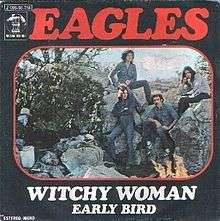Witchy Woman
| "Witchy Woman" | ||||
|---|---|---|---|---|
 | ||||
| Single by Eagles | ||||
| from the album Eagles | ||||
| B-side | "Early Bird" | |||
| Released | August 1, 1972 | |||
| Format | 7" | |||
| Recorded | Olympic Sound Studios, London, 1972 | |||
| Genre | Rock | |||
| Length | 4:14 | |||
| Label | Asylum | |||
| Writer(s) | Don Henley, Bernie Leadon | |||
| Producer(s) | Glyn Johns | |||
| Eagles singles chronology | ||||
| ||||
"Witchy Woman" is a song written by Don Henley and Bernie Leadon, and recorded by the American rock band Eagles. Released as the second single from the band's debut album Eagles, it reached No. 9 on the Billboard Pop singles chart[1] and is the only single from the album to feature Henley on lead vocals.
Background and writing
"Witchy Woman" was started by guitarist Bernie Leadon who wrote it while he was a member of the Flying Burrito Brothers.[2] After joining the Eagles, Bernie and Don Henley completed writing the song together, and it is only song that Henley wrote on the Eagles' debut album. The song was conceived while Don Henley was living in an old house near the Hollywood Bowl, with his flat mate, Henry Vine (aka 'Blitz'). Henley said of the origin of the song: "[Leadon] came over one day and started playing this strange, minor-key riff that sounded sort of like a Hollywood movie version of Indian music — you know, the kind of stuff they play when the Indians ride up on the ridge while the wagon train passes below. It had a haunting quality, and I thought it was interesting, so we put a rough version of it down on a cassette tape."[3] Henley also gave the song an R&B pulse in its music.[4]
While the inspiration for the title and lyrics was based on various women they had met and remembered as seductive enchantresses, Henley had Zelda Fitzgerald particularly in mind after reading her biography.[5] The muse and sometimes genius behind her well-published author husband F. Scott Fitzgerald, Zelda was known as wild, bewitching and mesmerizing and was the quintessential "Flapper", as her husband dubbed her, of the Jazz Age and the Roaring Twenties. In his novel, The Great Gatsby, Fitzgerald embodies Zelda's uninhibited and reckless personality in the character of Daisy Buchanan.[6] Theories and speculation on Zelda's behavior were widespread, with lyrics in "Witchy Woman" referring to Zelda's partying excesses being detrimental to her psyche: "She drove herself to madness with the silver spoon", is a reference to Zelda's time in a mental institution and the special slotted silver spoon used to dissolve sugar cubes with absinthe, the popular 1920s alcoholic beverage distilled from the wormwood tree and called "the green fairy" for sometimes inducing hallucinations. Henley said that he was suffering from flu with a very high fever and become semi-delirious while he was writing, and every time the fever subsided, he would continue to read a book on the life of Zelda Fitzgerald, and the song would be a mix of Zelda Fitzgerald "along with amorphous images of girls [he] had met at the Whisky and the Troubadour".[3]
"Witchy Woman" is one of the earliest songs written by the Eagles, and together with "Take It Easy" it was also the very few songs the band performed every night in its early days.[7] It was the first commercially successful song written by Don Henley, reaching No. 9 on the Billboard Hot 100 chart. Henley said of the song: "An important song for me, because it marked the beginning of my professional songwriting career.marked the beginning of my professional songwriting career".[3]
Personnel
- Don Henley: Lead Vocals, Drums
- Glenn Frey: Backing Vocals, Lead Guitar
- Bernie Leadon: Backing Vocals, Rhythm Guitar
- Randy Meisner: Bass Guitar, Backing Vocals
Popular culture
The song, along with "Desperado", was both used and referred to in an episode of the sitcom Seinfeld. In an episode of Dharma and Greg from the first season, Abbey, Dharma's mother, mentions that she dated Henley and is almost certain she is Witchy Woman. The song was used in a 2005 episode of the series Cold Case titled "In the Woods" (the episode was set during 1972, the year of the song's original release). It is also used in the movie America's Sweethearts to depict Catherine Zeta-Jones' character as she is getting out of a limousine.
Charts
| Chart (1972) | Peak position |
|---|---|
| Canada Top Singles (RPM)[8] | 8 |
| Netherlands (Single Top 100)[9] | 26 |
| US Billboard Hot 100[10] | 9 |
References
- ↑ "Eagles charted singles". Allmusic. Retrieved 20 February 2010.
- ↑ "Witchy Woman by Eagles". Song Facts.
- 1 2 3 Cameron Crowe (August 2003). "Conversations With Don Henley and Glenn Frey". The Uncool.
- ↑ Eliot, Marc (2004). To The Limit: The Untold Story Of The Eagles. Da Capo Press. pp. 92–93. ISBN 9780306813986. Retrieved January 21, 2016.
- ↑ "Liner Notes - The Very Best of The Eagles". Eaglesonlinecentral.com. 2001-09-10. Retrieved 2014-05-24.
- ↑ Elaine Showalter. "Review: Zelda Fitzgerald and The Love Letters of Scott and Zelda Fitzgerald | Books". The Guardian. Retrieved 2014-05-24.
- ↑ Eliot, Marc (2004). To The Limit: The Untold Story Of The Eagles. Da Capo Press. p. 72. ISBN 9780306813986. Retrieved January 21, 2016.
- ↑ "Top RPM Singles: Issue 7606." RPM. Library and Archives Canada.
- ↑ "Dutchcharts.nl – Eagles – Witchy Woman" (in Dutch). Single Top 100.
- ↑ "Eagles – Chart history" Billboard Hot 100 for Eagles.
External links
| ||||||||||||||||||||||||||||||||||||||